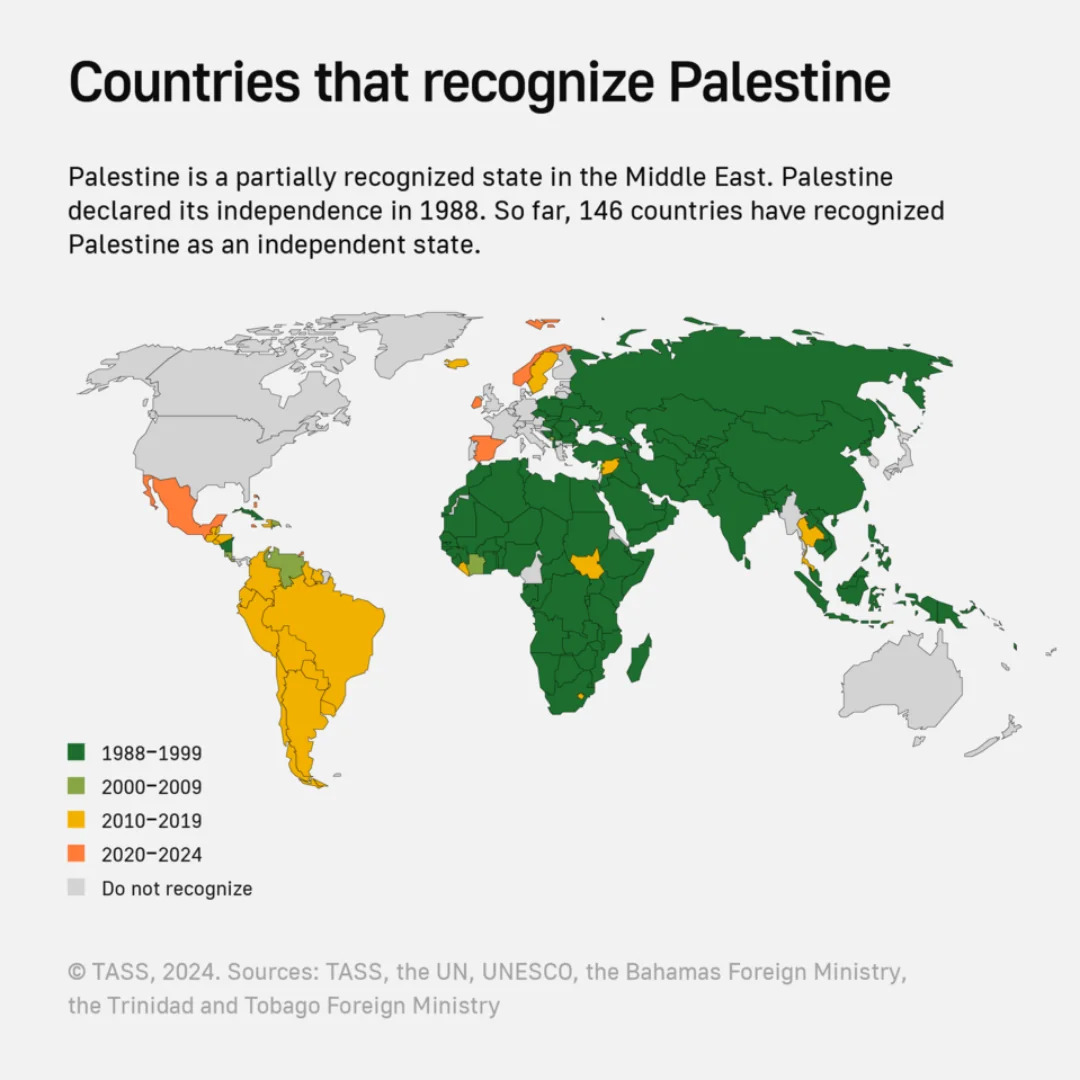The stated intentions of France, the United Kingdom, Canada and Australia may add to Israel’s growing international isolation and could prompt a reassessment — though not a fundamental shift — in support for Israel by the United States.

France, the United Kingdom, Canada and Australia have all indicated their intent to formally recognize the State of Palestine.
Looking toward the 80th session of the United Nations General Assembly in September, France, the United Kingdom, Canada and Australia have all indicated their intent to formally recognize the State of Palestine.
The moves are a striking departure from the recent stance of the United States, whose ambassador to Israel, Mike Huckabee, said last month that Washington no longer fully supports Palestinian statehood and has effectively abandoned the two-state solution.
The split within the Western bloc reflects a growing willingness by a number of countries to pursue foreign policy positions independent of the United States. Their aim appears to be twofold: pressure Israel to halt military operations in Gaza and reassert their leadership in global humanitarian and ethical discourse.
Public sentiment in many Western countries has shifted in response to the humanitarian crisis. On July 30, The Washington Post published a front-page article listing the names of 18,500 children killed in Gaza since the outbreak of hostilities in October 2023. Accompanied by images of severely malnourished children, the report attracted widespread international attention. Demonstrations in support of the Palestinian cause have since taken place in cities across France, the UK, Canada, and Australia.
The suffering is not limited to Palestinian civilians. On Aug. 2, Hamas released a video showing an Israeli hostage, Evyatar David, who appeared to be severely malnourished after reportedly going three days without food. His condition drew global sympathy and further highlighted the human toll.
The message is clear: Both Palestinian civilians and Israeli hostages are victims of the prolonged and devastating war. A cease-fire and renewed commitment to a two-state solution are seen by many as the only viable path to ending this humanitarian catastrophe.
Despite the new developments, there is little indication that Israeli Prime Minister Benjamin Netanyahu’s core policy objectives — especially his goal to “eradicate” Hamas — will be altered. Yet, the international perception of Israel is changing. Once widely viewed as a victim in the conflict, Israel is increasingly perceived as a perpetrator, particularly in light of its continued blockade and military campaign in Gaza.
Historically staunch supporters of Israel — countries such as France, the UK and Canada — are now adopting a more critical stance because of the scale of the humanitarian crisis. With Israel continuing to escalate its collective punishment of Palestinians in Gaza, a rising trend has emerged in European and NATO countries toward recognizing the State of Palestine. Since May last year, several European nations, including Spain, Norway, Ireland, Slovenia and Armenia, have formally recognized it. The addition of France, the UK and Canada, with their greater geopolitical weight, could prompt a new wave of recognitions among Western countries.
Currently, 147 of the 193 United Nations member states recognize Palestinian statehood. Recognition by major Western powers could also strengthen the legal and diplomatic case against Israel’s actions in Palestinian territories, potentially leading to greater involvement by international legal bodies and, eventually, to sanctions.
Although the recognition of Palestine by some U.S. allies may signal a weakening of what Washington has claimed was “unconditional” support for Israel, the core of the U.S.-Israel alliance remains intact. Netanyahu firmly believes that Trump made Israel greater. But Trump — under his “America first” slogan — must also take into account the shifting attitudes within his core domestic support base.
Political attitudes within the United States are evolving. According to recent polls, more than 30 percent of Republican voters under the age of 50 believe U.S. support for Israel has gone “too far.” A Gallup poll conducted in March found that public sympathy for Israel had reached a 25-year low, with only 46 percent of Americans expressing support.
Even under President Joe Biden the U.S. maintained that its support for Israel did not equate to an endorsement of all its actions. Statements from that period emphasized support for Israel’s existence while allowing for criticism of its policy decisions.
While the initial response from U.S. political circles — particularly those aligned with Trump — may involve strong rhetoric opposing the actions of France, the UK, Canada and Australia, these developments could still catalyze a more nuanced and restrained American approach toward Israeli policies, particularly in Gaza.
Despite the symbolic weight of potential recognition the declarations of intent remain, for now, largely just words. Their immediate practical effect on Israel is limited — especially in light of Netanyahu’s recent reiteration of his aim to reoccupy Gaza. While such diplomatic moves may gradually reshape international discourse on the Palestinian issue, they are unlikely to dismantle the deeply entrenched alliance between the United States and Israel in the foreseeable future.
